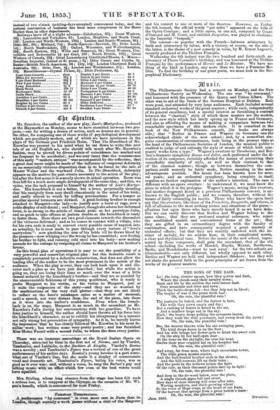ZuoIr.
The Philharmonic Society had a concert on Monday, and the New Philharmonic -Society on'Wednesday. The one was "by command," and honoured with the presence of the Queen and Prince Albert. The other was in aid of the funds of the German Hospital at Daiston. Both were good, and attended by very largo audiences. Each included several standard orchestral works of the great masters ; while each, independently of its general excellence, had a special interest as furnishing a contrast between the "classical" style of which those masters are the models, and the new style which has lately sprung up in France and Germany, and also as affording the means of making a comparison between two remarkable specimens of this modern style. It is remarked in the book of the New Philharmonic concert, (its books are always able,) that " Berlioz in France and Wagner in Germany are the acknowledged chiefs of the new school ; and, by a somewhat sin- gular concatenation of circumstances, both being at the present time at the head of the Philharmonic Societies of London, the musical publio is enabled to judge of and estimate the style of music of which both com- posers' works form a type." Wagner's overture to Tann/sailer, and Ber- lioz's dramatic symphony .Romeo and Juliet, each performed under the di- rection of its composer, certainly afforded the means of perceiving their remarkable similarity of style, as well as their contrast to that of the classical masters; though as between themselves the com- parison could scarcely be fairly made, Berlioz standing in the more advantageous position. His music has been known here for seve- ral years ; and an orchestral symphony, being complete in itself, requires no further explanation of the author's intention. The ease is different with an opera overture : to understand it, we must know the piece to which it is the prologue. Wagner's music, saving this overture, and another fragment heard at a previous Philharmonic concert, is un- known to the Eoglish public ; and we remain, therefore, without the means of fairly estimating its merits. Those who know the opera itself say that the overture, like those of the Freiechtitz, Euryanthe, and Oberon, is full of allusions to the most striking scenes and situations of the piece,— allusions lost upon those who have merely heard it as we have done. But we can easily discover that Berlioz and Wagner belong to the same class ; that they are professed musical reformers, who reject the established models and conventional forms of the art ; that they are gifted in an extraordinary degree with the faculty of combination, and have consequently acquired a great mastery of orchestral effects; but that they are scantily endowed with the in- stinct of melody, for we seldom hear, in their complicated scores, a clear and rhythmical tune. Before the music of the new school, repre- sented by these composers, shall gain the ascendant, that of the old school—including the works of Handel, Haydn, Mozart, Beethoven, Spohr, and Mendelssohn—must be cast away for the two schools are irreconcileable—not only different, but wholly opposed to each other. Berlioz and Wagner are bold and independent thinkers ; but they will not shake the general faith in the great principles of art drawn from the works of its greatest masters.


























 Previous page
Previous page